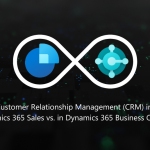
As the owner of a medium-sized manufacturing business, you’ve always kept critical programs (financial/proprietary data) on premise, while using a number of cloud applications for sales and marketing tasks. In the latter instance, a web portal handled ‘contact management’ and a few templates for generating contract and marketing proposals.
But as the business grows, so does the demand on your network: simultaneous users prevent a seamless flow of information throughout departments, vendors and clients. What’s needed is a single, database management system, like Microsoft Dynamics 365 ERP and CRM software.
According to a Forbes’ overview on “cloud ERP adoption,” SaaS software is predicted to grow by “45% within ten years,” as legacy ERP systems offer little in the way scalability to meet demands for “21st century compliance.” On the shop floor, for example, cloud apps provide the mobility for decision-makers to monitor tasks:
“ These apps and the speed of results they deliver are the new corporate bling. Intuitive, integrated and fast, these mobile apps make it possible for senior managers to check up on operations for wherever they are globally, in addition to approving contracts and being notified of events via alerts.”
Companies who continue customizing their legacy applications are, as Forbes notes in an April 2017 article, are being “lulled by a false sense of progress.” As Microsoft notes, Dynamics 365 brings together both the “front office and the back office” to manage all phases of the workflow—including financials.
If you are considering updating your business process management systems: consider Microsoft Dynamics 365 CRM/ERP for digital solutions today and in the future.





